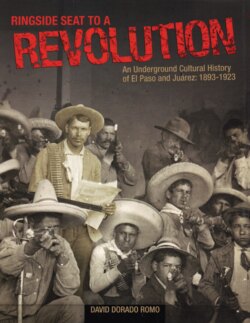Читать книгу Ringside Seat to a Revolution - David Dorado Romo - Страница 12
На сайте Литреса книга снята с продажи.
Оглавлениеhad posed for Otis Aultman’s camera anyway, sitting
stiffly next to each other. Pancho, famous for his
sweet tooth, had ordered the Elite Baseball, a scoop
of chocolate-covered vanilla ice cream, for ten cents.
Pascual didn’t want anything.
I walked two blocks down from the Elite
Confectionary to the First National Bank Building on
the corner of Oregon and San Antonio. In 1914, Villa
had his Consulado de Mexico there. El Paso Detective
Fred Delgado, who moonlighted as Villa’s secret
agent, worked out of Room 418. When the U.S. rec-
ognized Venustiano Carranza in 1915, Pancho Villa
shut the consulate down. I looked around the place,
maybe something had been left behind. Villa’s offices
were empty. The whole building was empty. No one
had even bothered to at least put up a little sign read-
ing, “Pancho Villa was here.”
Pancho Villa had been across the street at the El
Paso del Norte Hotel as well. That’s where my Latin
Jazz band, Fronteras No Más, used to play at the
hotel’s Dome Bar every Saturday night for tourists and
hip Latinos. Villa didn’t like that place too much
though. He thought too many perfumados—sweet
smelling dandies—stayed there, like the Guggenheims
(who owned one of the ASARCO smelters Villa threat-
ened to confiscate in Chihuahua), General Pershing,
Alvaro Obregón and the Terrazas clan.
He preferred to lodge at the Roma Hotel, on the
corner of Paisano and El Paso Street, during his
American exile in 1913. It was a more down-to-earth
place. Villa and his number one wife Luz Corral
stayed there after he escaped from a Mexico City
prison. She had a soft spot for El Paso too. Pancho
would walk around coddling pigeons in his arms.
People thought he was a little eccentric but he told
them pigeons were the only thing he could eat, on
account of his delicate stomach. The truth was he was
using them as homing pigeons, to send messages to
his rebel friends in Chihuahua.
Almost every evening, Pancho Villa would walk
downstairs to the Emporium Bar, which was also a lit-
tle strange since Pancho was a teetotaler. In 1914,
Emiliano Zapata insisted that they toast to their tri-
umphal entry into Mexico City with a sip of cognac
and Villa almost choked on it. At the Emporium Bar,
Villa would order nothing but strawberry soda pop,
6
Triumphal entry of the Maderistas after defeating the federals, 1911. Photo by David Hoffman.
(Rio Grande Historical Collections, Archives and Special Collections Department, NMSU.)
